#liberty requires personal autonomy
Explore tagged Tumblr posts
Text
Husband is playing a game called Tower Of Fantasy and screenshot this

KING: "Having barely enough to survive is the same as having nothing. For, if you find yourself in that state, whatever is left will soon be taken."
#welp#ain't that the truth#teach the children#life lessons in video games#political is personal#liberty requires personal autonomy
143 notes
·
View notes
Text
So, my friends will say that the Bell Riots already happened, in 2020.
Actually, when that episode aired, a lot of folks in my friends group said "I can see this happening by 2024."
I often rewatch it when I'm in a mood.





Star Trek: Deep Space Nine, S3E12 Past Tense, Part II
this episode is about an anti-governmental revolution in 2024 btw. just in case anyone was looking for ideas
5K notes
·
View notes
Text
A decade ago, when conservatives were attacking President Barack Obama’s Affordable Care Act as government encroachment in health care, they worked to amend state constitutions around the country to affirm a broad right for people to control their own medical decisions.
“Each competent adult shall have the right to make his or her own health care decisions,” reads section 38(a) of the Wyoming constitution’s Declaration of Rights, under the header “Right of healthcare access.” The provision was placed on Wyoming’s ballot by state lawmakers and approved by voters in 2012; voters saw ballot language that described the measure as preserving this right “from undue governmental infringement.”
Now these anti-ACA provisions—and their broad affirmations of a right to decide—have turned into an unlikely weapon in progressives’ fight against restrictions on abortion.
Reproductive rights advocates in Wyoming have sued to strike down the state’s abortion ban, saying that this “right to make . . . health care decisions” protects abortion access. A lawsuit in Ohio has made the same case using a similar provision in Ohio’s constitution that was adopted by voters in 2011.
“If you have an amendment that says you have the freedom to choose your health care, then that’s going to apply to all health care: that’s the argument being made,” says David Cohen, a professor of law at Drexel University who studies constitutions and abortion. “It’s like, ‘you used broad words, and these broad words have certain meanings, and we’re just applying those meanings to this context.’”
In both Ohio and Wyoming, these claims have seen early success in courts.
A trial court in Ohio issued a preliminary injunction against the state’s abortion restrictions in October. The judge found that the Health Care Freedom Amendment “bolsters the Ohio Constitution’s protection of liberty and personal autonomy and reinforces that these protections extend to Ohioans… the right to make decisions about their own bodies—including the fundamental right to make a decision as private and as central to a person’s bodily integrity as the decision to have an abortion.”
Freda Levenson, legal director of the ACLU of Ohio, which supports the lawsuit, says plainly, “The court was required to take this provision at its word: it preserves Ohioans’ freedom to choose their healthcare. And abortion is healthcare.”
In Wyoming, a trial court issued a preliminary injunction on a similar basis, concluding that it “could find that [section 38 of] the Wyoming Constitution affords all Wyoming citizens with a fundamental right to make their own health care decisions and that includes a Wyoming woman’s right to make her own decision regarding abortion.”
101 notes
·
View notes
Text
Gender self-determination as a medical right
Florence Ashley, CMAJ, vol. 196, E833–35 (2024)
Transgender people face many formal barriers to gender-affirming care, sometimes known as “gatekeeping.” Gender-affirming care refers to a wide range of medical interventions that patients pursue to affirm, actualize, or embody their sense of gender. Common forms of gender-affirming care include transition-related surgeries, hormone therapy, puberty blockers, and hair removal. Health care providers may refuse to offer gender-affirming care to transgender patients without an assessment of the person’s gender identity or dysphoria. Adolescents may, moreover, need to show that they have experienced gender dysphoria for several years before receiving care and may be denied care until they satisfy a strict age requirement.
I argue that physicians should rethink barriers to gender-affirming care in light of the principle of gender self-determination. By considering gender self-determination as a presumptive right, physicians are more likely to avoid unnecessary barriers to care. This presumption can be rebutted by showing that encroachments are adequately justified under standards detailed later in this article. Presumptive rights contrast with absolute rights, which cannot be rebutted or derogated from.
Being transgender is a matter of diversity, not pathology. When providers create barriers to gender-affirming care, they impair their patients’ ability to live out their sense of gender. Not every transgender person wishes to pursue gender-affirming interventions — it is a deeply personal choice — but many do. In Canada, 73% of transgender people want to or have pursued some form of gender-affirming care, and another 16% are unsure.2 Yet, only 26% of transgender people have received all the gender-affirming care they desire.
Medical autonomy and everyday autonomy
At the heart of medical ethics lies the principle of autonomy, according to which patients must be free to act “in accordance with a self-chosen plan.” Autonomy is the reason that patients have a right to refuse care, and it underpins health care providers’ duty to properly inform patients so that they can decide whether to accept a proposed treatment. Medical autonomy is, however, asymmetric. Whereas patients have the right to refuse an intervention, medical autonomy does not typically afford them the right to demand a specific intervention from their doctor. Nor does medical autonomy generally prevent providers from imposing discretionary restrictions and conditions on access to care.
Gender-affirming care, however, also engages the principle of gender self-determination, which is related to “everyday” autonomy: a person’s right to decide the shape of the life they want to live. Gender is a critical factor in how others refer to you, what facilities you use, whom you date, which peers you have, how others treat you, and which social norms are applied to you. Furthermore, a person’s primary and secondary sexual characteristics play a central role in social and sexual intercourse; bodily features influence whether others perceive you as a man, a woman, or nonbinary, or as trans- or cisgender; and having certain body parts also influences your ability to do many things, such as use urinals or have penetrative sex. If you do not feel like your body reflects your sense of gender, you may experience persistent discomfort in everyday life and struggle to flourish in your social or romantic life. Feeling misperceived may also cause you to withdraw from meaningful relationships and can be a source of substantial distress.
Gatekeeping gender-affirming care therefore imposes important limits on liberty, dictating critical aspects of transgender individuals’ social, interpersonal, and embodied life. The impact on transgender people of gatekeeping gender-affirming care extends far beyond the medical realm, permeating the deepest reaches and crevices of transgender people’s lives and defining their ability to live as themselves.
The principle of gender selfdetermination
Gender self-determination means that individuals have a right to define, express, and embody their gender identity as they see fit. It is one of the cornerstones of the Yogyakarta Principles, developed in 2006 by leading human rights experts, which state that
Each person’s self-defined … gender identity is integral to their personality and is one of the most basic aspects of self-determination, dignity and freedom. … No one shall be subjected to pressure to conceal, suppress or deny their … gender identity.
The principle of gender self-determination can be derived from and is supported by many long-recognized rights, including the right to free speech, equality, privacy, identity, and dignity, and to live and act with integrity. As explained by Loukēs G. Loukaidēs, later of the European Court of Human Rights: “For [someone] to be able to function freely, in the full sense of the term, [they] must have the possibility of self-definition and self-determination: the right to be [oneself].” Gender self-determination is implicitly and explicitly recognized by multiple international actors, including the European Court of Human Rights and the Inter-American Court of Human Rights.
Gender self-determination as a medical right
The principle of gender self-determination shapes the ethical obligations of health care providers. Given the impact of gender-affirming care on people’s ability to express, embody, and live out their gender in everyday life, a presumptive right to gender-affirming care for transgender people would seem essential to supporting the principle of gender self-determination. Transgender patients are, in this sense, in a special situation that expands the traditional scope of medical autonomy, a reasoning perhaps best expressed in the decision of the European Court of Human Rights in Van Kück v. Germany, which explained that “the burden placed on a person to prove the medical necessity of treatment, including irreversible surgery, in the field of one of the most intimate private-life matters, appears disproportionate.”
Medical care often constrains everyday liberty, but there are differences of kind and degree when it comes to gender-affirming care. Gender-affirming care is a way for the person to shape themselves from a gendered perspective, not a means of treating an underlying pathology. If transgender existence is understood, as it should be, in terms of diversity rather than pathology, gender self-determination comes to the fore as a medical right, and approaches to gender-affirming care rooted in a conventional diagnostic-and-cure model seem out of place. Gender-affirming care can be considered along similar lines as abortion, which is also desired for its own sake and often framed as a right.
Reconsidering barriers to gender-affirming health care
Gender self-determination is a presumptive right, meaning that it can be outweighed by other considerations. The burden of justifying barriers to care should fall on the health care providers who erect them and not on those seeking care to affirm their gender. A barrier to gender-affirming care would be justified if there were clear and compelling evidence that it prevents harms of sufficiently great magnitude to unambiguously outweigh the barrier’s negative impacts on gender self-determination and well-being. The harm that barriers seek to prevent must be sufficiently serious to outweigh individuals’ autonomy in defining the most fundamental aspects of their personal identity, bearing in mind also that impairing one’s ability to live out one’s sense of gender is psychologically and socially harmful. It is important to remember that autonomy includes the right to make bad decisions for oneself. The freedom to make only good decisions would be meaningless.
For illustrative purposes, I wish to briefly touch on 2 common barriers to gender-affirming care: the requirement that adolescents prove several years of gender incongruence and rigid age requirements. The requirement that adolescents experience “several years of persistent gender diversity/incongruence” before initiating hormone therapy or surgery is not grounded in evidence that immediate access to gender-affirming interventions, without waiting several years, is associated with regret or negative mental health outcomes. Similarly, the use of rigid age requirements for certain interventions lacks empirical evidence and does not take into consideration differences in youths’ cognitive and emotional maturation. Contemporary understandings of autonomy recognize its gradual development and heterogeneity across the population, an understanding that is recognized in Canadian law under the mature minor doctrine. In the words of the Convention on the Rights of the Child, youths’ views must be “given due weight in accordance with the age and maturity of the child.” This calls for an individualized approach that is incompatible with rigid age lines. In the future, providers should also consider whether there is sufficient evidence justifying requirements for transgender adolescents and adults to prove their gender identity or dysphoria before offering care.
Conclusion
In this article, I have argued that providers of gender-affirming care have an ethical duty to respect the gender self-determination of patients and accordingly bear the burden of justifying the barriers they erect on access to gender-affirming care. Health care providers working with transgender communities should carefully examine their gatekeeping practices to ascertain whether they are justified by clear and compelling evidence and abandon those that cannot meet this justificatory threshold.
#lgbtq#queer#lgbtqia#transgender#trans#lgbt#trans rights#transgender rights#trans rights are human rights#gender affirming care#gender affirming healthcare#gender affirmation#medicine#human rights
187 notes
·
View notes
Text
extended author's notes | castling
castling (Lucanis/Rook/Spite, DA: Veilguard, explicit): AO3 link
I wrote one of these notes for another fic, and I really enjoy looking back at a completed project and talking about it. Here's the DVD commentary + my process notes for anyone who's interested below the cut!

An evolving story
castling was written after a 6-month writer's block. I talk a little about it here, but basically, it started out as a drabble that I kept adding on scenes to, and it changed along the way.
The original planned theme of the story was mimetic desire. Basically—do we value a thing for what is, or because others desire it greatly as well? In an OT3 this leads to interesting dynamics that I wanted to explore.
As I wrote and played more of the game, I found my second theme: acceptance of the shadow self. This eventually became the main theme I focused on, so I'll reproduce my fevered tags here:
what if the parts that you've been taught are ugly or wrong your whole life manifested as a literal demon
but that demon also gave you the strength to do what was required to survive
what if your trauma taught you survival mechanisms to keep you alive?
what if someone understood they were as much a part of you as everything they loved about you
what if they loved them just as much as the rest of you
what does forgiveness and letting go look like?
2. Remixing canon
I didn't want to do a straight retelling of the canon Rook/Lucanis romance (lots of authors have done a fantastic job of it! I don't know what I would add!)
The challenge I set myself was to branch off from the "Minrathous is saved" decision point. In this world state, Lucanis and Rook have been flirting gently up to "Coffee With The Crows", before things get messy. I wrote a few guiding statements and motivations:
Lucanis is hardened and becomes avoidant of Rook.
Rook must win back his trust through words and deeds ("Bloodbath").
Spite is fascinated by Rook, maybe even to a worrying degree. (To him, she is Determination personified.)
Spite has autonomy and wants to separate from Lucanis.
Rook reciprocates Spite's attentions. More importantly, she acknowledges his autonomy.
Lucanis cannot tell where his desire for revenge and his attraction to Rook arises from—or he knows but is afraid to confront it.
Spite will never knowingly hurt Rook.
From there, it was easier to figure out the scenes I wanted to write, and everyone's behaviours. For example:
Spite becomes the obvious "wingman", manoeuvring situations to bring him (and Lucanis) closer to Rook.
Rook becomes the more active partner who initiates romantic gestures. There is no "almost kiss" scene in the pantry. Instead, Rook initiates a hand-kiss.
Spite uses "we" in the waking world but "I" in the Fade to refer to himself (special cookies for you if you spotted this :)
"Inner Demons" never happens in this world state. Instead, Spite and Lucanis learn to work together because of Rook.
3. In character
Ada "Rook" Aldwir
Rook's personality is pretty well defined in the game so I tried to stay true to it. ("Heroic nonsense saved your grandson and is rescuing you now.") She is outgoing, intuitive, and direct but ultimately well-meaning. Rook is a Veil Jumper—and no one goes into the haunted magic forest willingly if they love the modern city and systems they live in. (She hints at this in chapter 4, and I would love to explore it in future.) This affinity for the strange and liminal makes her sympathetic to Spite. Rook is more of a cipher in the earlier chapters, but I think she came to life in the sparring scene. The way she fights barehanded was inspired by wushu and the Monk class from DnD, focused on her element of lightning. (In Veilguard, she is a Spellblade.)
Spite
Spite is sarcastic, demanding and mercurial. I took a few liberties with this character, including picking he/him pronouns to add to the blurring of boundaries with Lucanis. Spite speaks much more eloquently in-game in the Fade (in Inner Demons), and I preferred that style. He begins castling by taking over Lucanis, but once he finds equilibrium (through them both agreeing on their feelings for Rook), they start sharing the pilot seat. I knew that I wanted Spite and Rook to have a connection, apart from Lucanis, so the Fade was the natural place to set their "bottle episode". As I wrote about Spite and Lucanis' imprisonment, I realised that for a spirit who was content in the Fade, being ripped away and trapped in a limited form would be horrific. I didn't need to write elaborate, graphic torture after that—the implications for them were terrible enough. (Most of chapter 5 was me sobbing over this.)
Lucanis (I know he's everyone's blorbo, and I'll try not to step on any toes here!)
Lucanis is cautious, charming and kind. I chose to write him not as demisexual, but tied up in knots about sex and violence because of the nature of his work. I didn't want him to be an afterthought to the Rook/Spite relationship. He kept running away so much at the beginning, I was genuinely worried we would have no story, so I deliberately wrote chapter 4 from his POV. After that, Lucanis was surprisingly the easiest character for me to inhabit while writing. He's also such a naturally sweet character that his almost silly overprotectiveness of Rook just happened. I really enjoy the way they both play off each other, because Ada is such a Creature in so many ways, and he's simply moonstruck. It's one of my favourite dynamics that appears in my other stories as well.
4. Recurring motifs I enjoyed discovering
Not all of these were planned, but in no particular order: the knife to the neck, electricity, spirits/angels and demons, small repeated gestures (a lover's vocabulary), awareness of the breath, restraint/self-denial as torture, hand holding, the body as both a site of violence and pleasure.
5. In closing
If you made it all the way down here, thank you for listening to me ramble! I hope you enjoyed reading castling as much I did writing it: I learnt a lot, and I exorcised a lot of hang ups about my work in the process. I definitely have thoughts about how to improve the story (crucially, the Lucanis/Spite relationship is missing here), but I'll take that energy into the next piece.
I realise most of this is about the "framework" of the story; if you'd like to know my thoughts around any particular scenes please feel free to send me an ask anytime <3
#dvd commentary#complete self-indulgence#spite dragon age#ada aldwir#lucanis dellamorte#my writing#dustdeepsea fic: castling
9 notes
·
View notes
Text
Most rules are based on fear, too. What if I'm not afraid of the things the rulemakers are. What if I am the things the rulemakers fear.
"do you seriously think you're above the rules" the stupid ones yeah
#autistic inability to follow a rule i believe to be unjust or immoral#liberty requires personal autonomy#I think this is why I turned to libertarian socialism in the first place#being queer in fandom was pure defiance
109K notes
·
View notes
Text
Runner, Pt. 1
Runner (S02E03) is the episode in which Ronon Dex is introduced and hence focuses very much on establishing his character.

Rewatching the episode now, it seems so obvious that something has definitely changed between Sheppard and McKay somewhere between the two seasons. Here, they are acting like McKay and Grodin did in the first season, which gives credence to the idea that they too had hooked up before, that it was a previous relationship that made their interpersonal relationship subtly yet strangely hostile. The interaction between Sheppard and McKay in this episode is tinged with the bitter feelings and petty digs of exes that are forced to work together. I can't believe I thought Trinity (S02E05) was the point where things started going south for them. Clearly, it was just the culmination of things.
The episode begins with Major Lorne on a planet with his own away-team, his character also introduced in the episode. It seems as though Major Lorne is one of the new members that Sheppard had personally picked for the expedition, given that Weir gave all of the senior staff liberty to choose their own staff. In the case of the military Sheppard probably didn't have as much autonomy in the choices as other members of the senior staff but it definitely seems as though Lorne had been chosen by him personally, being that, as a Major, he is now not only Sheppard's second in command--he basically has Sheppard's old job. Lorne is what Sheppard would have been if Colonel Sumner had survived, and this gives us an interesting insight into Sheppard. Sheppard had been forced to take on a role that was well beyond his current capacity at the time, and he had grown into the role. But by observing Lorne we are able to see what Sheppard's role as a Major should have been.

What's really interesting is that Major Lorne seems to be a gay man. It is never explicitly stated, we learn precious little about his personal life, and very obviously he is required to be as closeted about it as any of them were during this time period. But the character definitely gives off a ding on the old gaydar, and it figures that Sheppard very likely caught onto it. In fact, this probably had been the reason he picked Lorne, since his experiences with Sgt. Bates, who was his former second in command and as a marine seems to have held some views that didn't sit well with him (and not all of them had to do with Teyla, either) had been difficult, so it figures Sheppard would want someone around that he could trust, that he didn't have to be as careful around, whose opinions he didn't have to worry about constantly.
And yes, in spite of Lorne being as surreptitious as any of them about his orientation, Sheppard would have been able to spot him just because the ability to know who might give you a handjob helping hand and who might punch your teeth in is, in the context of the military, a vitally important skill to have. It's always easier to see from the inside out than from the outside in, is the thing.

But regardless, Sheppard choosing a gay man for his second in command is pretty telling, all things considered. And it's not because he ever had any personal interest in Evan Lorne, either. Sheppard just wanted to be able to relax, even just a little. He needed someone that would have his back and not question his command every step of the way. He needed someone that would be able to tell him if and when he was out of line that wouldn't result in him being blackmailed or threatened with exposure, or who whose concern wouldn't come out of a place of irrational hatred but from actual professional concern. Sheppard had many good reasons for picking out Major Lorne.
So, Lorne and his team are on an alien planet. We get to see his interaction with his own science officer, to compare this with how Sheppard and McKay were in the very beginning (and, given that Ford seems to be observing them up from a tree, it's entirely possible he too was reminded of the two of them while watching Lorne and Parrish). Presumably Lorne was given the chance to form his own team so he likely chose Parrish for his team just as Sheppard chose to have McKay on his team. And they are bonding, the episode begins with Lorne sharing private information about himself with his doctor. They do seem to get along just fine, and it's notable that it's just the two of them deep in the forest with the rest of his team having stayed back by the gate. And while they seem to be very different people with very different interests, Lorne does seem to care about his doctor and Parrish seems to trust his Major to protect him. Lorne is protective of his doctor too, making sure that he gets back safe and sound as his first priority when they chance upon a killed wraith on a planet that was thought not to support animal life. Also, while we don't know precisely how long these two have known each other, Lorne is not afraid to touch him to get him to move on. They do parallel Sheppard and McKay in the very beginning.

Upon having returned to Atlantis, Lorne is in Weir's office having a meeting with Sheppard when they are joined by Teyla. Beckett comes in right at her heel, informing them that while his autopsy is going to take a while, the wraith was likely killed by Ford. McKay walks is less than 30 seconds after Teyla and, for some reason we are never explained, Sheppard decides to chew his head off about it:


McKay: What's going on? Sheppard: Thanks for coming, Rodney. McKay: What? I was right in the middle of a-- Weir: P3M-736. We found a dead Wraith, maybe killed by Ford.
When Teyla walked in, Sheppard informed him about the situation right away. When McKay walked in, he gets personal in a way that has nothing to do with the briefing. McKay, who for all intents and purposes probably had been doing something important, came in almost immediately following Teyla, and yet Sheppard felt the need to get on his case about being late. And it's Weir that actually has to fill him in on what's going on because Sheppard has a hard time staying professional. However, notice how when both Teyla and Beckett walk in Sheppard does not turn toward them but only turns his head back to look at them. When McKay enters, he turns his body. Not all the way around, like he would have done previously, but he still turns. He throws his shoulder back even when he's giving his sarcastic greeting. What ever the two of them have decided, his body hasn't quite received the message yet.
And it's not even that Sheppard is upset about McKay being late because he wasn't, not really. Sheppard is more upset about the fact that where McKay spends his time is no longer his business and he's not aware of his whereabouts every second of the day like he preferred to do previously.

It's notable that McKay is wearing a new type of shirt, and there's probably symbolism in it. The shirt is dark with only stripes of blue to mark him as a member of the science team on the flanks. While McKay seems perfectly normal, seems entirely like himself, this change in wardrobe suggests that there is something darker going on inside him. His mood is dark. His outlook is bleak. Sheppard is acting prickly like a cactus toward him where it does not appear as though he's gone anything to deserve it. And it's clever, the way they use Ford here to conceal the subtextual narrative, to hide what's going on. The audience can choose to interpret Sheppard's foul mood to be entirely about Ford. He feels responsible, he feels guilty for letting this happen to someone under his command, so it's making him lash out at everyone around him because, even though he has just received a promotion, John Sheppard is wholly incapable of behaving in a professional manner.
Only, it doesn't explain why he's taking it mostly out on McKay. It doesn't explain why his relationship with McKay is the one that has most changed from the end of the previous season. And oh, he's trying. Sheppard is trying very hard to be professional with McKay. In fact, there's a jarring discrepancy in what he says and how he says it. On the face of it, "Thanks for coming" is a positive statement. McKay is a busy man and Sheppard is grateful he's taken the time to do this. But his tone is dripping with sarcasm, as though he's saying "Look at who finally showed up". Now, Sheppard does have a tendency of making things sound sarcastic that he doesn't necessarily mean to be sarcastic. Here, it's probably half that. He intended to greet McKay in a polite and professional manner, but his internal feelings made the words come out laced with his bitterness.

Sheppard: He could still be there. McKay: Whoa, wait a second. 736? The U.V. index there during the day is something like a thousand. Sheppard: Bring your sunscreen. Be ready in ten minutes.
Put a pin on the fact that Sheppard tells McKay to bring his sunscreen here, we'll return to that later. What's interesting about this is that it follows the events of The Intruder (S0202) where both Sheppard and McKay had just received a nearly lethal dose of radiation. We don't know precisely how long has passed between the two episodes, but it must have been recent. And McKay is right to be worried because, as he told Sheppard in Hot Zone (S01E13), he's not precisely a stranger to receiving radiation. In fact, then it was McKay that was soothing Sheppard's worry about getting too much radiation from the EMP:
Sheppard: Should I pay attention to all these warnings? McKay: Not today, no.
McKay: Don't worry, I've probably been around more EMPs than anyone. Sheppard: This is gonna be... I'm gonna be fine, right? McKay: Yes. That's a yes, you'll be fine.
The thing is, ionizing radiation has a cumulative effect. The effects add up over time and the clock isn't reset after every exposure. And given what they had just experienced getting way too close to the coronsphere of a sun, getting large dozes of radiation again is dangerous to the both of them. And previously, Sheppard might have listened to McKay. For sure he would have wanted to go after Ford, it is important for him that they find him, but he would at the very least have been more sympathetic toward McKay's concerns. Maybe they would have figured some way of protecting themselves.

Now, it's not just like he doesn't care, it's that he's making McKay come with out of spite. The man that passes McKay here is a man with a broken heart. And even here, as he passes him, his body does turn toward him.
He doesn't quite seem to have a handle on how to be the boss of him but he is trying. But because his attitude is so dismissive of McKay and his concerns, he transfers his attitude onto everyone else too. They give him looks, like he's being a yellow belly scaredy-cat that hasn't risked his life and his potential future offspring for them time and again. In fact, McKay and Lorne seem to get off to a very lopsided start because Lorne's first impression of McKay is coloured by Sheppard's attitude. It isn't fair, which McKay is able to point out himself:


McKay: What?! I wanna get Ford back just as much as everyone else, but do you see my complexion? Teyla: Yes. McKay: Yes, it's very fair! Extremely fair. This isn't fair...
Sheppard looks McKay dead in the eye as he takes off from Weir's office as though daring him to say something, as though challenging him to undermine him in front of everyone. But he doesn't stay to hear any objections, he really seems to need to get out of that office as fast as he can. He is literally running away, and although Ronon is the eponymous "Runner" of the episode, both Sheppard and McKay do their fair share of running in it.
And the thing is, if this was the first time we saw these two men, we might come to the conclusion that they don't really like each other. That Sheppard is, for some reason or another, forced to suffer working with McKay when he would rather not be doing that, like he hadn't chosen the man for his team personally. That it's because of their clashing personalities that they don't get along, Sheppard being dutiful, stoic and responsible, McKay being lackadaisical, cowardly and careless. Only, that's not who they are. In many ways, that's the opposite of who they are. They both seem to be wearing these roles as protective armour around them.

Because Ford is used in this way, it also obscures how much of Sheppard's feelings about the Ford situation are actually due to what ever is going on between him and McKay behind the scenes. Yes, he definitely feels all kinds of ways about Ford but he also seems to be projecting some of the negative feelings he has about his personal life into the Ford situation, making him into a symbol for his anger, a kind of a lightning rod for his bad mood. But it's not all about Ford. If it was all about Ford, his reactions would be way overblown.
And to this end, Caldwell, still on base, has concerns about Sheppard and his sentiments toward Ford, and the fact that also he sees Sheppard's disposition as overblown is telling. Caldwell catches up with Sheppard as he's running from the meeting, apparently having been on the look for him:


Sheppard: You mind if we go over that again when I get back? Caldwell: Colonel! Sheppard: You don't have to remind me of our respective positions or that you outrank me, sir. Caldwell: I was wondering if I needed to remind you that Lieutenant Ford is a significant threat to the security of this base. Sheppard: He's also a friend in need. Caldwell: His condition forces him to seek out the wraith. If he's caught, he would compromise--
You can tell that Sheppard was running away from the scene in Weir's office by the way he reacts to Caldwell calling out to him, as though he'd just caught him doing something he wasn't supposed to. Sheppard is acting irrationally but because he's the main character, we are asked to sympathize with his position when Caldwell's warning is perfectly reasonable, all things considered. Sheppard is doing the thing he has been accused of many times in the past, letting his personal feelings compromise his command. In fact, Caldwell uses the word here, which seems to trigger Sheppard.

Now, because Caldwell follows Sheppard into the transporter and they are having a conversation while it happens, it's easy to miss something really important here.
Sheppard was not going to the armoury/changing room for the away teams here, even though he told McKay they would be leaving in 10 minutes and that would be the logical assumption. That room is under Weir's office adjacent to the central tower, which makes sense. That is where they need weapons the most and that is where the away-teams leave from, so it makes sense to have their gear be near-by. So, he must be going somewhere else.

Now, we don't precisely know where McKay's quarters are but based on what we see in Duet (S02E04), they seem to be closer by to the central tower than Sheppard's. From this episode onward, when ever Sheppard is going to his quarters, he is using the transporter. We never saw him use the transporter to go to his quarters in the first season, and certainly not after Before I Sleep (S01E15), in which McKay and Sheppard were looking for new quarters literally for them. But, it doesn't appear as though Sheppard's quarters have changed. When we see him in his room, it's the same room as before. So, if Sheppard has not changed his room but between the previous episode and this there is a change in how he gets to his quarters, it follows that for the better part of the first season, he was not staying in his own quarters but somewhere else. The fact that from hereon out we always see him use the transporter to get to his quarters but did not before means that Sheppard has moved, but if he has moved and we still find in the same quarters, it means he wasn't actually living there previously. This is a small detail and yet significant.
Based on Teyla's dream in The Gift (S01E18), it seems like Sheppard's quarters are somewhere pretty close to Teyla's. This probably means that his quarters are near where the Athosians were originally located before they move to the mainland, and where they were located was further away from the main tower that was occupied by earthlings. That also makes sense. Sheppard probably originally chose quarters near the Athosians in a gesture of solidarity toward them, to show them that he trusts them and to show his own people that they're not a threat. That also tracks. But then, the Athosians move to the mainland and Sheppard had no particular reason to hang around in a part of the city that must have felt pretty abandoned after they had all gone. In her dream, Teyla saw only a dead corpse in Sheppard's bed, suggesting that she knew she would not find him there.
But now, the situation has changed. Sheppard needs space, needs to be further away from everyone, he needs to be alone. So it figures that he would have taken up his old quarters further away again, now that he is no longer sharing a bed with McKay wherever McKay's quarters are. Again, to emphasize, from hereon out, following their return to Atlantis from Earth at the end of the previous episode, we always see Sheppard use the transporter to get to his own quarters. Previously, we did not. But the location of his quarters is unchanged. This isn't complicated math.
Also notice the rumpled condition of his jacket. Especially as they walk side by side, we can compare the condition of Sheppard's jacket to Caldwell's uniform. Sure, this could be a wardrobe malfunction but allowing for a moment that it's rumpled on purpose, Sheppard has clearly been sleeping in his fatigues. He has been sleeping alone and he hasn't bothered undressing for the occasion.


And yes, all of this could be caused by the Ford situation. It definitely seems to be causing him pain, and the fact that he doesn't really have any arguments to give Caldwell means that somewhere deep down inside, he agrees with the man. Only, like he told Ford's cousin, as far as he's concerned, Ford is still alive and he has actually lost other people under his command during his time on Atlantis. So Ford does not explain everything. In fact, Sheppard's obsession with it may be an attempt to avoid some other difficult feelings. What Ford seems to be is the final straw for him; final, but not the most significant overall.
There's also a rather weird reference to "Code Orange," Caldwell reminding Sheppard that all senior officers are to be informed of "situations Code Orange and above". Sheppard further elaborates on this system, asking Caldwell whether the codes go from blue-orange-red or from red-orange-blue. But the thing is, this is not US military classification or situation awareness system. Code orange is often used by hospitals, and it was a color on the Homeland Security Advisory System for the classification of threats that did come under use during the Bush administration, when the show was airing. Code orange was a "high risk of terrorist attacks". Only, it ran from green-blue-yellow-orange-red, which seems to fit ill with Sheppard's comment (and having been deployed in Afghanistan during the "war on terror," he would have to be familiar with this system).
The US Military uses the DEFCON defense readiness condition system, which has been used by SGC in the franchise, which runs from 5 to 1, and while they are color-coded, there is no DEFCON orange. So, it's possible this is a situation awareness system particular to the mission, which is fair enough. We never see nor hear of this system again, so it seems like an odd throw-away line. But the thing is, the colors red, orange, and blue--the three of them in particular--are used by a system, the US government classification system for information. It has three levels, Red: secret, Orange: top secret, Blue: confidential.
I find it suspicious that they make reference to these three colors in particular when the colors don't make sense with any kind of an situational awareness classification used by any military. It's weird for them to insert this piece of dialogue into their discussion since it really doesn't bearing on anything, it's another throw-away line. Only, McKay is wearing an orange rubber suit for most of the episode, except for the end, when he wears blue. Now, this could mean nothing. Only, the franchise won several awards for its realistic depiction of the US Air Force. They didn't tend to just make shit up. So, what gives? Something connected to McKay is obscured, this much seems almost certainly true with regards to this episode.
There's a lot going on in this scene besides this. For one, they are clearly hashing out the chain of command here. Sheppard is the military commander of Atlantis but Caldwell outranks him, and while the Daedalus is on Atlantis, it's not entirely clear who holds the superiority. Surely in all matters Atlantis is should be Sheppard, and in all matters pertaining to US military, it should be Caldwell. But right now, in his current mental state, Sheppard is really not in the mood to play soldier, and he does not want to take orders from anyone.


You can tell that Sheppard bucking Caldwell's authority by how he first takes the high ground to try to impress his will on Caldwell, and then steps right up to him, walks right up in his grill to further stand his ground about this. He's doing this his way, and has no intention of backing down. However, Caldwell is not intimidated by him. He has been doing this a lot longer than Sheppard, and there's certainly a reason he had been given command of one of the most important pieces of technology on Earth and had, in fact, been chosen by the SGC to become the new military commander of Atlantis. And while his words for Sheppard are harsh, they are well-meaning words of advice from a senior colleague that he needs to hear.
Sheppard: Look, I'm gonna find him, and I'm gonna bring him back. Caldwell: According to Doctor Beckett's report, there may not be anything that can be done to help him. Sheppard: With all due respect, sir, I hope you're not saying what I think you're saying. Caldwell: Lieutenant Ford has already proven resourceful enough to penetrate security and escape the city. I'm saying if you encounter him and there's any chance whatsoever that his capture might prove elusive, you are duty bound to eliminate the threat. Lieutenant Ford may have been your friend, but he's not any more. I know you understand, you'll do what's right. You didn't seem to have a problem with mercy when it came to Colonel Sumner. Dismissed.
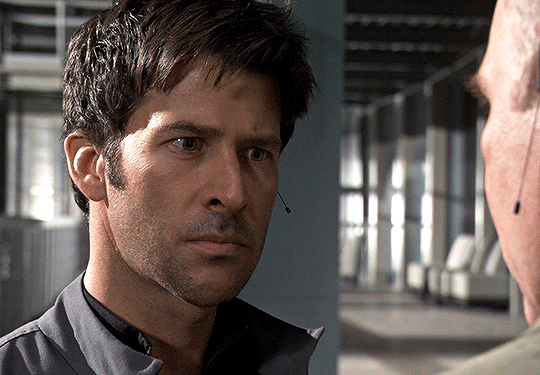

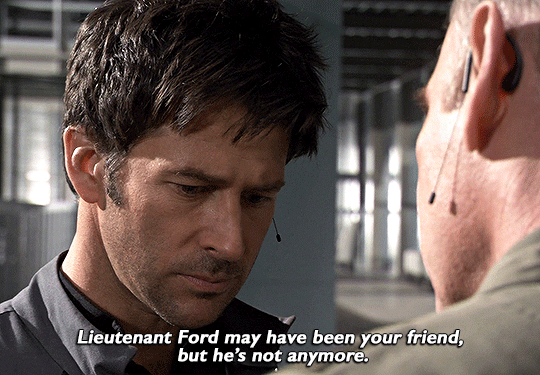
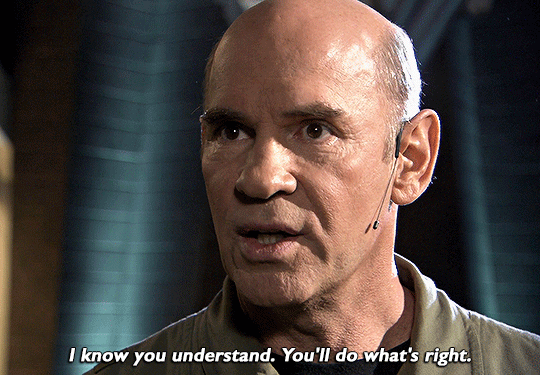
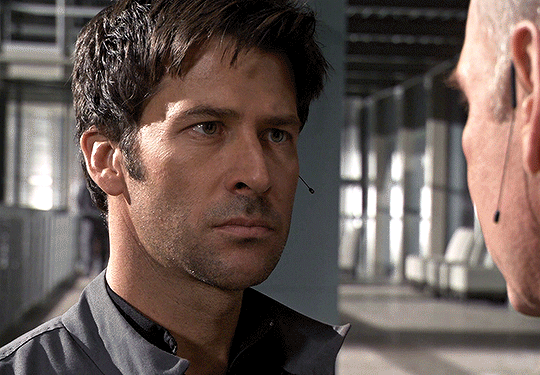

It's interesting that they bring up Sheppard's friendship with Ford here, where there seems to be a lot of unfriendliness between Sheppard and McKay all of a sudden. We are invited to look back at what the relationship between Sheppard and Ford was like and while they were friendly, Sheppard was certainly always closer with McKay. In fact, Ford seemed rather jealous of the connection between the two of them and desired the same kind of closeness with Sheppard, not knowing what had laid the foundation for this closeness. But especially toward the end of the first season, Sheppard and McKay were like two peas in a pod.
And now, suddenly, they're not. They're not friends, and they're barely able to be friendly toward each other. And in this, they are in contrast. Where Ford may have been Sheppard's friend and is not anymore, McKay was never his friend but is now attempting to be one. They are both failing miserably at this trying to be friends thing, but they are trying. But it seems obvious that that's just not a thing they can be to each other.

Now, Caldwell does not actually give Sheppard an order here, he only reminds him of his duty. And Sheppard, as he's wont to do, does not acknowledge the Colonel's words in any way. The only thing that tells Caldwell he received them is the minute twitch in his cheek as he grinds his teeth together not to say anything in the heat of the moment he might later regret. This is a skill Sheppard had probably perfected already during his boarding school years, possibly even earlier than that. He could keep his thoughts to himself. But not giving the Colonel a piece of his mind doesn't mean that he didn't hear what he said, and the fact that he didn't like what he heard doesn't mean it wasn't true or right. The fact that the Colonel was right just made it worse. He takes off, and he doesn't salute Caldwell even though he was officially dismissed. Sheppard seldom salutes either up or down the chain of command.
And in this regard, Sheppard hearing truths that he doesn't want to hear, it's interesting that the look he gives Caldwell here at the end is very similar to the look he gave McKay at the end of their argument in front of Chaya's quarters in Sanctuary (S01E14). Then, too, McKay had been telling him things that he didn't want to hear but which were undeniably true. And the thing is, it should be McKay that was telling him when he was out of line. He used to be able to trust McKay to do that for him. However much he may have hated to hear it, he knew it came from a place of love and that's why it at least gave him pause. Made him think things through. But now, it seemed like McKay barely cared enough to come to meetings on time. He missed having someone to talk to. He missed having someone there for him. He missed him so much.
There seems to be a whole lot of things going on here that can only be explained by the fact that Rodney McKay may have been Sheppard's lover, but he's not any more.
Continued in Pt. 2
#sga#stargate atlantis#sga meta#john sheppard#sheppard is bi#rodney mckay#rodney is gay#ep. runner#ep. duet#ep. before i sleep#ep. hot zone#ep. trinity#ep. sanctuary
15 notes
·
View notes
Text

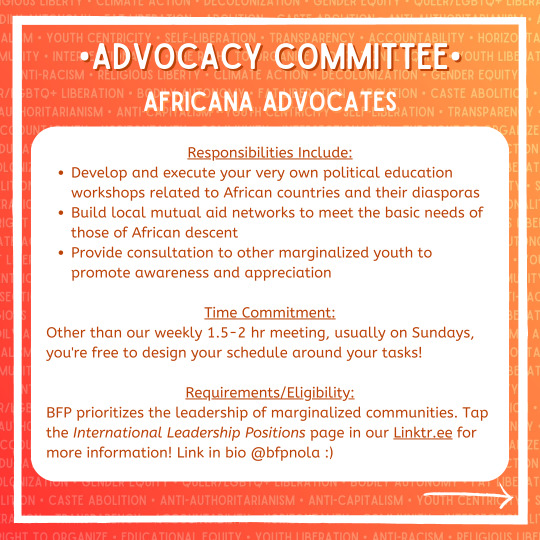

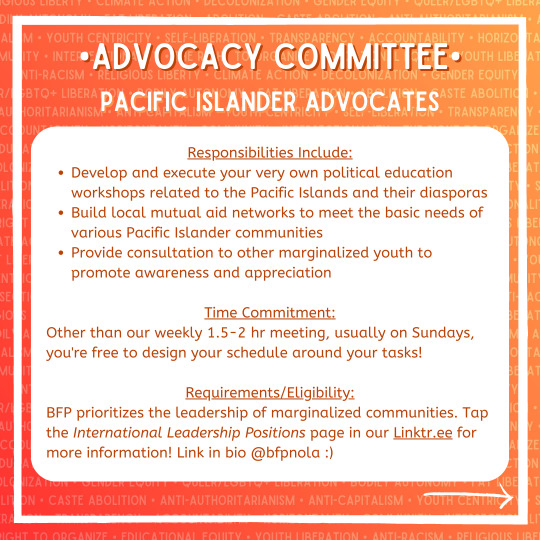


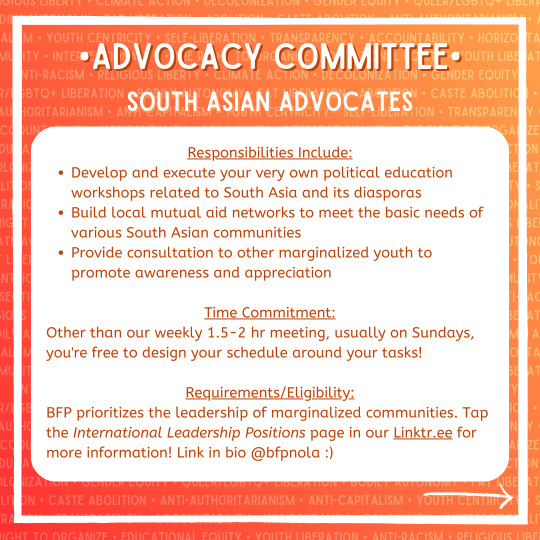
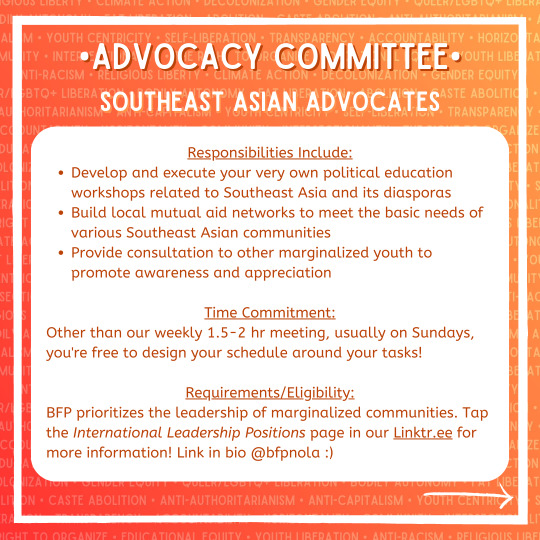

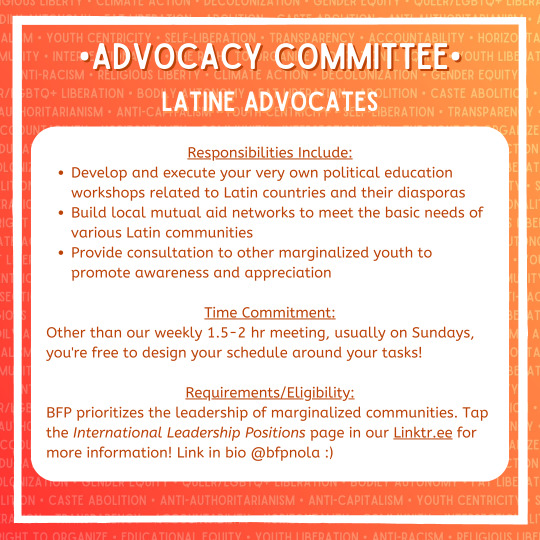
Hey! We're back with part 2! Better Future Program (@bfpnola) is officially looking for youth volunteers between the ages of 14 and 25 for our Advocacy Committee. Don't see a role that fits your identity or beliefs? Don't worry! We've got SO MANY opportunities, we had to split them up across multiple posts! Feel free to check our Linktr.ee for more positions or our "Apply Now!" highlight on Instagram in the coming weeks!
And if you don’t know who we are? Welcome! BFP is Black-, queer-, and woman-owned nonprofit, entirely run by youth! Since 2016, we���ve been accepting volunteers not just from Bulbancha (so-called New Orleans, Louisiana), but WORLDWIDE! Our mission is to globally expand peer-led political education, support, and imagination for marginalized youth!
To fulfill this goal, we offer over 3,000 free resources through our Liberation Library, design and execute mutual aid-based projects, and offer the safe space young activists need to ask questions and grow. If this sounds like something you’d be interested in, check out our International Youth Leadership Positions page in our bio!
Image description below.
[ID: All slides share the same background. There is a repeating list of BFP’s guiding principles and core beliefs in translucent, all-white, capitalized letters. BFP’s guiding principles include youth-centricity, self-liberation, transparency, accountability, horizontality, community, and intersectionality. BFP’s core beliefs include the right to organize, educational equity, youth liberation, anti-racism, religious liberty, disability justice, climate action, decolonization, gender equity, queer/LGBTQ+ liberation, bodily autonomy, fat liberation, abolition, caste abolition, anti-authoritarianism, and anti-capitalism. A burnt orange to amber gradient overlays this list. A bold, white square frames the image with a white arrow pointing right in the bottom right corner.
Slide 1 reads: “LINK IN BIO. APPLY NOW! INTERNATIONAL YOUTH LEADERSHIP POSITIONS! REMOTE & IN-PERSON.” There is a BFP logo in the lefthand corner and the words “Part Two” in the righthand corner, as this is the first of multiple posts showcasing open leadership positions.
Slide 2 reads: "Advocacy Committee: Africana Advocates
Responsibilities Include:
Develop and execute your very own political education workshops related to African countries and their diasporas
Build local mutual aid networks to meet the basic needs of those of African descent
Provide consultation to other marginalized youth to promote awareness and appreciation
Time Commitment:
Other than our weekly 1.5-2 hr meeting, usually on Sundays, you're free to design your schedule around your tasks!
Requirements/Eligibility:
BFP prioritizes the leadership of marginalized communities. Tap the International Leadership Positions page in our Linktr.ee for more information! Link in bio @bfpnola :)" Slide 3 reads: "Advocacy Committee: Indigenous Advocates
Responsibilities Include:
Develop and execute your very own political education workshops related to your Indigenous community
Build local mutual aid networks to meet the basic needs of various Indigenous communities
Provide consultation to other marginalized youth to promote awareness and appreciation
Time Commitment:
Other than our weekly 1.5-2 hr meeting, usually on Sundays, you're free to design your schedule around your tasks!
Requirements/Eligibility:
BFP prioritizes the leadership of marginalized communities. Tap the International Leadership Positions page in our Linktr.ee for more information! Link in bio @bfpnola :)" Slide 4 reads: "Advocacy Committee: Pacific Islander Advocates
Responsibilities Include:
Develop and execute your very own political education workshops related to the Pacific Islands and their diasporas
Build local mutual aid networks to meet the basic needs of various Pacific Islander communities
Provide consultation to other marginalized youth to promote awareness and appreciation
Time Commitment:
Other than our weekly 1.5-2 hr meeting, usually on Sundays, you're free to design your schedule around your tasks!
Requirements/Eligibility:
BFP prioritizes the leadership of marginalized communities. Tap the International Leadership Positions page in our Linktr.ee for more information! Link in bio @bfpnola :)" Slide 5 reads: "Advocacy Committee: Central Asian Advocates
Responsibilities Include:
Develop and execute your very own political education workshops related to Central Asia and its diasporas
Build local mutual aid networks to meet the basic needs of various Central Asian communities
Provide consultation to other marginalized youth to promote awareness and appreciation
Time Commitment:
Other than our weekly 1.5-2 hr meeting, usually on Sundays, you're free to design your schedule around your tasks!
Requirements/Eligibility:
BFP prioritizes the leadership of marginalized communities. Tap the International Leadership Positions page in our Linktr.ee for more information! Link in bio @bfpnola :)" Slide 6 reads: "Advocacy Committee: East Asian Advocates
Responsibilities Include:
Develop and execute your very own political education workshops related to East Asia and its diasporas
Build local mutual aid networks to meet the basic needs of various East Asian communities
Provide consultation to other marginalized youth to promote awareness and appreciation
Time Commitment:
Other than our weekly 1.5-2 hr meeting, usually on Sundays, you're free to design your schedule around your tasks!
Requirements/Eligibility:
BFP prioritizes the leadership of marginalized communities. Tap the International Leadership Positions page in our Linktr.ee for more information! Link in bio @bfpnola :)" Slide 7 reads: "Advocacy Committee: South Asian Advocates
Responsibilities Include:
Develop and execute your very own political education workshops related to South Asia and its diasporas
Build local mutual aid networks to meet the basic needs of various South Asian communities
Provide consultation to other marginalized youth to promote awareness and appreciation
Time Commitment:
Other than our weekly 1.5-2 hr meeting, usually on Sundays, you're free to design your schedule around your tasks!
Requirements/Eligibility:
BFP prioritizes the leadership of marginalized communities. Tap the International Leadership Positions page in our Linktr.ee for more information! Link in bio @bfpnola :)" Slide 8 reads: "Advocacy Committee: Southeast Asian Advocates
Responsibilities Include:
Develop and execute your very own political education workshops related to Southeast Asia and its diasporas
Build local mutual aid networks to meet the basic needs of various Southeast Asian communities
Provide consultation to other marginalized youth to promote awareness and appreciation
Time Commitment:
Other than our weekly 1.5-2 hr meeting, usually on Sundays, you're free to design your schedule around your tasks!
Requirements/Eligibility:
BFP prioritizes the leadership of marginalized communities. Tap the International Leadership Positions page in our Linktr.ee for more information! Link in bio @bfpnola :)" Slide 9 reads: "Advocacy Committee: West Asian Advocates
Responsibilities Include:
Develop and execute your very own political education workshops related to West Asia and its diasporas
Build local mutual aid networks to meet the basic needs of various West Asian communities
Provide consultation to other marginalized youth to promote awareness and appreciation
Time Commitment:
Other than our weekly 1.5-2 hr meeting, usually on Sundays, you're free to design your schedule around your tasks!
Requirements/Eligibility:
BFP prioritizes the leadership of marginalized communities. Tap the International Leadership Positions page in our Linktr.ee for more information! Link in bio @bfpnola :)" Slide 10 reads: "Advocacy Committee: Latine Advocates
Responsibilities Include:
Develop and execute your very own political education workshops related to Latin countries and their diasporas
Build local mutual aid networks to meet the basic needs of various Latin communities
Provide consultation to other marginalized youth to promote awareness and appreciation
Time Commitment:
Other than our weekly 1.5-2 hr meeting, usually on Sundays, you're free to design your schedule around your tasks!
Requirements/Eligibility:
BFP prioritizes the leadership of marginalized communities. Tap the International Leadership Positions page in our Linktr.ee for more information! Link in bio @bfpnola :)" /End ID.]
#reaux speaks#hiring#volunteer#youth activism#african#african diaspora#african american#black power#indigenous#aboriginal#first nations#native american#pacific islander#central asia#west asia#south asia#southeast asia#east asia#latine#latinx#chicano#advocacy#youth#high school#middle school#university#remote#in person#hybrid#abolition
76 notes
·
View notes
Note
do you think vaccines should be mandatory? my view has always been that public health would outweigh personal choice in this instance but i also see the bodily autonomy argument, though ultimately i think it’s flawed and weird to compare, say, abortions with vaccines. i was wondering if you had an opinion or any resources on this topic?
this is one of those questions where i think the framing conceals a lot of unspoken premises and social/political assumptions. what do we even mean by a vaccine mandate in the first place? the truth is that in many contexts, vaccines are already mandatory—the trick is that these mandates are generally designed and first enforced by employers, schools, and private business establishments, rather than coming through direct state intervention. incidentally, most censorship works similarly, despite it also being positioned discursively as a matter of direct state intervention. the truth is that you are far more likely to run into problems if you, say, have an employer who requires vaccination—which makes your paycheck (that is, your ability to continue living) dependent on a medical intervention—than you are to face some kind of right-winger fear fantasy of a shadowy government agent showing up to your doorstep with a syringe. these things happen by economic coercion far more than through direct state command.
with that in mind, to me the issue that 'vaccine mandates' point to isn't so much an idealist conflict between 'safety' and 'liberty' or however nyt is framing it these days—rather, it's the fact that employers have the structural position to impose their will on employees, who often must comply or face, literally, starvation. i am willing to say this is a bad social structure despite the fact that in the case of vaccines i obviously agree that the particular intervention in question is a good thing, and is something that anyone who is medically eligible should be getting. in order to make vaccines mandatory, you need an enforcement mechanism—the one we currently primarily rely on is economic coercion in the form of threatening loss of livelihood (again, this also applies to most censorship cases). while i, again, strenuously think that people who can get vaccinated should do so, in order to make such a thing compulsory you have to confront the issue of what power structures make the compulsion possible and actionable. prisons? relying on the political whims and economic threats of employers? too often, a 'mandatory vaccine' is presented as though it could be ethically debated in the abstract, without reference to these conditions!
anyway, i'm not going to pretend that i can solve vaccine hesitancy in the next 90 seconds in a tumblr post, but off the top of my head here are some factors i think are major contributors to this issue:
ableism (eg, andrew wakefield preying on the fact that many parents would rather risk their children catching preventable dangerous diseases than let them be supposedly exposed to a greater chance of becoming autistic)
public distrust of physicians and public health infrastructure, for reasons ranging from medical racism and eugenics to discomfiting and traumatic experiences with the inherently (in this system) power-imbalanced relationship between medical professionals and patients
the massive gap between expert and lay knowledge on medical topics, enforced by mechanisms like paywalls and benefitting the prestige and pecuniary enrichment of physicians and public health experts (this provides fertile ground for grifters and liars to prey on people's confusion and difficulty verifying information)
possibilities for lies about vaccines to lead to financial enrichment, as in the case of social media grifts, heterodox and alternative medical practitioners, or eg andrew wakefield trying to sell his own vaccine after publishing his now-retracted paper on the supposed link between autism and the mmr vaccine
these are all bad things; they are also all actionable things. i do not think that it's some kind of transhistorical condition of humanity that we must choose between either passing each other dangerous diseases or designing coercive or punitive measures to force compliance with public health recommendations. i think all of these things are in fact very directly resultant of capitalism, the way it values bodies and health (biopolitics), and its politics of knowledge and expertise.
69 notes
·
View notes
Text
Either you believe in bodily autonomy or you fucking don't.
Yall do NOT hop on a cosmetic surgery hate train during an ongoing campaign against trans Healthcare I am fucking begging
32K notes
·
View notes
Text
Free speech takes us to new, uncomfortable, and occasionally uncivil places, and universities must celebrate this fact if they wish to remain laboratories for democratic discourse. They must also celebrate that free speech is for everyone; using accessibility tools to screen speech that could otherwise not be pre-reviewed flies in the face of this principle.
In her blog, Wong said she changed her remarks out of fear of being disinvited. While the email from the school official did not include an explicit threat of disinvitation, the chilling effect of the request was nonetheless felt.
49 notes
·
View notes
Text
Here is another letter you can send your Attorney General.
Trump was given immunity for subversion charges but this could be reversed & he could be pulled from office. In the past the Supreme Court reversed decisions based on previous cases (listed below). It can change is ruling if it believes the earlier decision was wrong or does not align with evolving legal interpretations, societal changes, or the text of the Constitution. The constant constitutional violations gives good reason to revoke this immunity and go after this whole regime for doing the same 1. Plessy v. Ferguson 1896 -> Brown v. Board of Education 1954 Separate is NOT equal 2. Bowers v. Hardwick (1986) vs. Lawrence v. Texas (2003) Protected LGBTQ rights. Court recognized a broader right to personal autonomy and the right to engage in consensual private sexual conduct.
3. Lochner v. New York (1905) vs. West Coast Hotel Co. v. Parrish (1937) Upheld minimum wages. Court shifted from an economic-liberty focus to a more accepting stance on government regulation of the economy, especially during the Great Depression.
Charges should be brought against all those in the regime who have taken part in violations of Constitutional rights:
Due Process- Under the 14th Amendment, no state shall deprive any person of life, liberty, or property without due process of law. If Trump's actions resulted in violations of due process (for example, in handling immigration laws or actions related to detention or treatment of individuals), legal precedents and lawsuits could potentially emerge. For example, Gideon v. Wainwright (1963) established the right to counsel for criminal defendants, and violations of due process have been significant in many civil rights cases. The case of the Maryland man being deported without due process and sent to prison even though even the VP says he is innocent is proof of this.
Birthright Citizenship- The 14th Amendment grants U.S. citizenship to anyone born in the U.S., with exceptions for children of foreign diplomats or enemy forces. Changes to birthright citizenship would require either new legislation or a constitutional amendment. If someone were attempting to challenge this principle, it would likely face significant constitutional scrutiny, and any action by a president or government official to alter this practice would be tested in court. Precedent: For example, in United States v. Wong Kim Ark (1898), the Supreme Court affirmed that children born in the U.S. to foreign parents are U.S. citizens, solidifying the principle of birthright citizenship. Please ask the Supreme Court to resend immunity to Trump and prosecute all of those that have violated our constitution. Signed, your name
4 notes
·
View notes
Text
The Philosophy of Collectivism
The philosophy of collectivism is a worldview that emphasizes the importance of groups, communities, or societies over individual interests. It holds that the well-being and goals of the collective should take precedence over the desires and rights of individual members. Collectivism is often contrasted with individualism, which prioritizes individual autonomy and personal freedom.
Key Aspects of the Philosophy of Collectivism:
Primacy of the Group:
Social Unity: Collectivism stresses the importance of social cohesion and unity, arguing that individuals are inherently connected to their communities and that their identities and purposes are largely shaped by their social relationships.
Shared Goals: In collectivist thought, the goals of the group, whether a family, community, nation, or humanity as a whole, are prioritized over personal ambitions. The success of the group is seen as a reflection of individual success.
Moral and Ethical Foundations:
Altruism and Cooperation: Collectivism often promotes altruism, the idea that individuals should act in ways that benefit others, sometimes at the expense of their own interests. Cooperation and mutual support are considered essential for the well-being of the group.
Responsibility to Others: Ethical collectivism holds that individuals have a moral duty to contribute to the common good and to support the welfare of others in their community or society.
Political and Economic Implications:
Socialism and Communism: Collectivist philosophies are often associated with political and economic systems like socialism and communism, where resources and power are distributed in ways intended to benefit the collective rather than individuals. These systems advocate for collective ownership or control of the means of production and seek to reduce inequality.
Welfare State: In more moderate forms, collectivism can be reflected in the welfare state, where the government plays a significant role in ensuring social security, healthcare, education, and other public goods, based on the principle that society as a whole is responsible for the well-being of its members.
Cultural and Social Dimensions:
Cultural Collectivism: In some cultures, collectivism is deeply ingrained in social norms and values. For example, many Asian, African, and indigenous cultures emphasize family, community, and collective responsibility over individualism.
Collective Identity: Individuals in collectivist cultures often see themselves as part of a larger whole and may prioritize group harmony and consensus over personal expression or dissent.
Critiques and Challenges:
Loss of Individual Freedom: Critics of collectivism argue that it can lead to the suppression of individual rights and freedoms, as the needs of the collective may override personal liberties. This can result in authoritarianism or the erosion of personal autonomy.
Homogenization and Conformity: Another critique is that collectivism can encourage conformity and discourage diversity and innovation, as individuals might feel pressured to align with group norms and expectations.
Philosophical Justifications:
Communitarianism: Communitarianism is a philosophical approach that emphasizes the value of community in shaping individuals' identities and values, and it often supports collectivist principles by arguing that individuals are best understood in the context of their social relationships.
Ethical Theories: Ethical theories like utilitarianism can support collectivism to the extent that they promote the greatest good for the greatest number, which may require individuals to sacrifice their interests for the benefit of the collective.
Historical and Contemporary Examples:
Traditional Societies: Many traditional societies operate on collectivist principles, with strong emphasis on family ties, communal land ownership, and collective decision-making.
Modern Collectivist Movements: Modern movements advocating for environmental sustainability, social justice, or economic equality often embody collectivist principles by focusing on the well-being of the broader community or the planet.
The philosophy of collectivism offers a perspective that values the interconnectedness of individuals and the importance of collective well-being. While it provides a framework for fostering social unity, cooperation, and shared responsibility, it also raises important questions about the balance between individual rights and collective interests, and how best to achieve social harmony without sacrificing personal freedom.
#philosophy#epistemology#knowledge#learning#education#chatgpt#ethics#politics#economics#Collectivism#Communitarianism#Social Unity#Altruism#Socialism#Communism#Welfare State#Group Identity#Cultural Collectivism#Ethical Collectivism#Collective Responsibility#Political Philosophy#Community vs. Individualism
11 notes
·
View notes
Text
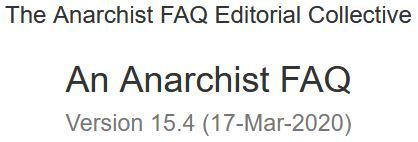
I.6.2 Doesn’t communal ownership involve restricting individual liberty?
This point is expressed in many different forms. John Henry MacKay (an individualist anarchist) put the point as follows:
”‘Would you [the social anarchist], in the system of society which you call ‘free Communism’ prevent individuals from exchanging their labour among themselves by means of their own medium of exchange? And further: Would you prevent them from occupying land for the purpose of personal use?’ … [The] question was not to be escaped. If he answered ‘Yes!’ he admitted that society had the right of control over the individual and threw overboard the autonomy of the individual which he had always zealously defended; if on the other hand he answered ‘No!’ he admitted the right of private property which he had just denied so emphatically.” [Patterns of Anarchy, p. 31]
However, anarchist theory has a simple and clear answer to this question. To see what this answer is, it simply a case of remembering that use rights replace property rights in an anarchist society. In other words, individuals can exchange their labour as they see fit and occupy land for their own use. This in no way contradicts the abolition of private property, because occupancy and use is directly opposed to private property (see section B.3). Socialisation is rooted in this concept of “occupancy and use” and this means that in a free communist society individuals can occupy and use whatever land and such tools and equipment as they need — they do not have to join the free communist society (see section I.5.7). If they do not, however, they cannot place claims on the benefits others receive from co-operation and communal life.
This can be seen from Charlotte Wilson’s discussions on anarchism written a few years before MacKay published his “inescapable” question. She asks the question: “Does Anarchism … then … acknowledge … no personal property?” She answers by noting that “every man [or woman] is free to take what he [or she] requires” and so “it is hardly conceivable that personal necessaries and conveniences will not be appropriated” by individual’s for their personal consumption and use. For ”[w]hen property is protected by no legal enactments, backed by armed force, and is unable to buy personal service, its resuscitation on such a scale as to be dangerous to society is little to be dreaded. The amount appropriated by each individual .. . must be left to his [or her] own conscience, and the pressure exercised upon him [or her] by the moral sense and distinct interests of his [or her] neighbours.” This system of “usufruct” would also apply to the “instruments of production — land included”, being “free to all workers, or groups of workers” for “as long as long and capital are unappropriated, the workers are free, and that, when these have a master, the workers also are slaves.” [Anarchist Essays, p. 24 and p. 21] This is because, as with all forms of anarchism, communist-anarchism bases itself on the distinction between property and possession.
In other words, possession replaces private property in a free society. This applies to those who decide to join a free communist society and those who desire to remain outside. This is clear from the works of many leading theorists of free communism (as indicated in section G.2.1), none of whom thought the occupying of land for personal use (or a house or the means of production) entailed the “right of private property.” For example, looking at land we find both Kropotkin and Proudhon arguing along the same lines. For the former: “Who, then, can appropriate for himself the tiniest plot of ground … without committing a flagrant injustice?” [Conquest of Bread, p. 90] For the latter: “The land cannot be appropriated”. Neither denied that individuals could use the land or other resources, simply that it could not be turned into private property. Thus Proudhon: “Every occupant is, then, necessarily a possessor or usufructuary, — a function that excludes proprietorship.” [What is Property?, p. 103 and p. 98] Obviously John Henry MacKay, unlike Kropotkin, had not read his Proudhon! As Wilson argued:
“Proudhon’s famous dictum, ‘Property is theft’, is the key to the equally famous enigma … ‘From each according to his capacities, to each according to his needs’. When the workers clearly understand that in taking possession of railways and ships, mines and fields, farm buildings and factories, raw material and machinery, and all else they need for their labour, they are claiming the right to use freely for the benefit of society, what social labour has created, or utilised in the past, and that, in return for their work, they have a just right to take from the finished product whatever they personally require.” [Op. Cit., pp. 20–1]
This can be seen from libertarian communist William Morris and his account of Proudhon. Morris classed the French anarchist as “the most noteworthy figure” of a group of “Socialist thinkers who serve as a kind of link between the Utopians and the school of … scientific Socialists.” As far as his critique of property went, Morris argued that in What is Property? Proudhon’s “position is that of a Communist pure and simple.” [Political Writings, p. 569 and p. 570]
Unsurprisingly, then, we find Kropotkin arguing that ”[a]ll things belong to all, and provided that men and women contribute their share of labour for the production of necessary objects, they are entitled to their share of all that is produced by the community at large.” He went on to state that “free Communism … places the products reaped or manufactured in common at the disposal of all, leaving to each the liberty to consume them as he [or she] pleases in his [or her] own home.” [The Place of Anarchism in Socialistic Evolution,, p. 6 and p. 7] This obviously implies a situation of “occupancy and use” (with those who are actually using a resource controlling it).
This support for possession does not, of course, imply any contradiction with communism as MacKay suggested. The aim of communism is to place the fruits of society at the disposal of society, to be used and consumed as the members of that society desire. As such, individuals are not stopped from taking and using the goods produced and, obviously, this automatically means “excluding” others from using and consuming them. This in no way implies the recreation of private property in any meaningful sense. Significantly, this perspective has been pretty commonplace in human society and numerous authors have pointed out “how many languages lack any verb for unilateral ownership.” [David Graeber, Possibilities, p. 23]
For example, a group of friends go on a picnic and share the food stuffs they bring. If someone takes an apple from the common bounty and eats it, then obviously it is no longer available for others to eat. However, this does not change the common ownership of foodstuffs the picnic is based on. Similarly, in a communist society people would still have their own homes and, of course, would have the right to restrict entry to just those whom they have invited. People would not come in from the street and take up residence in the main bedroom on the dubious rationale that it is not being used as the inhabitant is watching TV in the lounge, is on holiday or visiting friends.
Thus communism is based on the obvious fact that individuals will “appropriate” (use) the products of society to satisfy their own needs (assuming they can find someone who needs to produce it). What it does, though, is to deprive individuals of the ability to turn possession into private property and, as a result, subjugate others to their will by means of wage labour or landlordism.
In other words, possession (personal “property”) is not transformed into social property. Hence the communist support for individuals not joining the commune, working their land or tools and living by their own hands. Being based on possession, this is utterly compatible with communist principles and the abolition of private property. This is because people are using the resources in question and for that simple reason are exercising the same rights as the rest of communist society. Thus the case of the non-member of free communism is clear — they would also have access to what they possessed and used such as the land, housing and means of production. The difference is that the non-communists would have to barter with the rest of society for goods rather than take what they need from the communal stores.
To re-iterate, the resources non-communists use do not become private property because they are being used and they revert back into common ownership once they are no longer occupied and used. In other words, possession replaces property. Thus communist-anarchists agree with Individualist Anarchist John Beverley Robinson when he wrote:
“There are two kinds of land ownership, proprietorship or property, by which the owner is absolute lord of the land to use it or hold it out of use, as it may please him; and possession, by which he is secure in the tenure of land which he uses and occupies, but has no claim on it at all if he ceases to use it. For the secure possession of his crops or buildings or other products, he needs nothing but the possession of the land he uses.” [Patterns of Anarchy, p. 273]
This system, we must note, was used in the rural collectives during the Spanish Revolution, with people free to remain outside the collective working only as much land and equipment as they could “occupy and use” by their own labour. Similarly, the individuals within the collective worked in common and took what they needed from the communal stores (see section I.8).
MacKay’s comments raise another interesting point. Given that Individualist Anarchists oppose the current system of private property in land, their system entails that “society ha[s] the right of control over the individual.” If we look at the “occupancy and use” land system favoured by the likes of Tucker, we discover that it is based on restricting property in land (and so the owners of land). As discussed in section G.1.2, the likes of Tucker looked forward to a time when public opinion (i.e., society) would limit the amount of land which individuals could acquire and so, from MacKay’s perspective, controlling their actions and violating their autonomy. Which, we must say, is not surprising as individualism requires the supremacy of the rest of society over the individual in terms of rules relating to the ownership and use of possessions (or “property”) — as the Individualist Anarchists themselves implicitly acknowledge.
MacKay goes on to state that “every serious man must declare himself: for Socialism, and thereby for force and against liberty, or for Anarchism, and thereby for liberty and against force.” [Op. Cit., p. 32] Which, we must note, is a strange statement for, as indicated in section G.1, individualist anarchists like Benjamin Tucker considered themselves socialists and opposed capitalist private property (while, confusingly, many of them calling their system of possession “property”).
However, MacKay’s statement begs the question: does private property support liberty? He does not address or even acknowledge the fact that private property will inevitably lead to the owners of such property gaining control over the individuals who use, but do not own, it and so denying them liberty (see section B.4). As Proudhon argued:
“The purchaser draws boundaries, fences himself in, and says, ‘This is mine; each one by himself, each one for himself.’ Here, then, is a piece of land upon which, henceforth, no one has right to step, save the proprietor and his friends; which can benefit nobody, save the proprietor and his servants. Let these multiply, and soon the people .. . will have nowhere to rest, no place of shelter, no ground to till. They will die of hunger at the proprietor’s door, on the edge of that property which was their birth-right; and the proprietor, watching them die, will exclaim, ‘So perish idlers and vagrants.’” [Op. Cit., p. 118]
Of course, as Proudhon suggested, the non-owner can gain access to the property by becoming a servant, by selling their liberty to the owner and agreeing to submit to the owner’s authority. Little wonder that he argued that the “second effect of property is despotism.” [Op. Cit., p. 259] As discussed in section G.4.1, this points to a massive contradiction in any form of individualist anarchism which defends private property which goes beyond possession and generates wage-labour. This is because both the state and the property owner both assume sole authority over a given area and all within it. Little wonder Emile Pouget, echoing Proudhon, argued that:
“Property and authority are merely differing manifestations and expressions of one and the same ‘principle’ which boils down to the enforcement and enshrinement of the servitude of man. Consequently, the only difference between them is one of vantage point: viewed from one angle, slavery appears as a property crime, whereas, viewed from a different angle, it constitutes an authority crime.” [No Gods, No Masters, vol. 2, p. 66]
So the issue changes if someone claims more resources than they can use as individuals or as a co-operative group. If they are attempting to restrict access to others of resources they are not using then the others are entitled to simply ignore the pretensions of the would-be monopoliser. Without a state to enforce capitalist property rights, attempts to recreate private property will flounder in the laughter of their neighbours as these free people defend their liberty by ignoring the would-be capitalist’s attempts to subjugate the labour of others for their own benefit by monopolising the means of life. Unsurprisingly, MacKay does not address the fact that private property requires extensive force (i.e. a state) to protect it against those who use it or could use it but do not own it.
So MacKay ignores two important aspects of private property. Firstly, that private property is based upon force, which must be used to ensure the owner’s right to exclude others (the main reason for the existence of the state). And secondly, he ignores the anti-libertarian nature of “property” when it creates wage labour — the other side of “private property” — in which the liberty of employees is obviously restricted by the owners whose property they are hired to use. Unlike in a free communist society, in which members of a commune have equal rights, power and say within a self-managed association, under “private property” the owner of the property governs those who use it. When the owner and the user is identical, this is not a problem (i.e. when possession replaces property) but once possession becomes property then despotism, as Proudhon noted, is created. As Charlotte Wilson put it:
“Property — not the claim to use, but to a right to prevent others from using — enables individuals who have appropriated the means of production, to hold in subjection all those who possess nothing … and who must work that they may live. No work is possible without land, materials, and tools or machinery; thus the masters of those things are the masters also of the destitute workers, and can live in idleness upon their labour… We look for th[e] socialisation of wealth, not to restraints imposed by authority upon property, but to the removal, by direct personal action of the people themselves, of the restraints which secure property against the claims of popular justice. For authority and property are both manifestations of the egoistical spirit of domination”. [Op. Cit., pp. 57–8]
Therefore, it seems that in the name of “liberty” John Henry MacKay and a host of other “individualists” end up supporting authority and (effectively) some kind of state. This is hardly surprising as private property is the opposite of personal possession, not its base. In summary, then, far from communal property restricting individual liberty (or even personal use of resources) it is in fact its only defence. That is why all anarchists would agree with Emma Goldman that “it is our endeavour to abolish private property, State … we aim to free men from tyrants and government.” [A Documentary History of the American Years, vol. 1, p. 181]
#anarchist society#practical#practical anarchism#practical anarchy#faq#anarchy faq#revolution#anarchism#daily posts#communism#anti capitalist#anti capitalism#late stage capitalism#organization#grassroots#grass roots#anarchists#libraries#leftism#social issues#economy#economics#climate change#climate crisis#climate#ecology#anarchy works#environmentalism#environment#solarpunk
4 notes
·
View notes
Text
The Downfall of the US Supreme Court
The recent trajectory of the United States Supreme Court has raised significant concerns about its credibility and impartiality. The Court, historically viewed as a pillar of justice and an arbiter of constitutional integrity, now faces scrutiny due to a series of decisions that appear to align closely with right-wing ideologies. This perceived shift challenges the foundational principles of impartiality and equity that are essential for maintaining public trust in the judiciary.
One of the most contentious issues involves the Court's rulings on voting rights. Decisions such as Shelby County v. Holder, which invalidated key provisions of the Voting Rights Act, have been criticized for undermining efforts to protect against racial discrimination in voting. By effectively weakening federal oversight, the Court has enabled the implementation of state-level laws that disproportionately affect minority voters, raising questions about the commitment to ensuring equal access to the democratic process.
Additionally, the Court's approach to reproductive rights has sparked significant debate. The overturning of Roe v. Wade in the Dobbs v. Jackson Women’s Health Organization decision represents a profound shift in legal precedent, affecting millions of women across the country. Critics argue that this decision not only disregards decades of established jurisprudence but also imposes a particular moral viewpoint, thereby infringing on personal liberties and bodily autonomy.
The influence of corporate interests on the Court's decisions has also come under scrutiny. In cases like Citizens United v. FEC, the Court has expanded the role of money in politics, equating financial expenditure with free speech. This interpretation has paved the way for unprecedented levels of corporate influence in elections, potentially skewing political outcomes in favor of wealthy interests at the expense of ordinary citizens.
Furthermore, the Court's stance on environmental regulations has raised alarms among advocates for climate action. By limiting the Environmental Protection Agency’s ability to regulate greenhouse gas emissions, the Court appears to favor deregulation over environmental protection, potentially jeopardizing efforts to combat climate change and protect public health.
The cumulative effect of these decisions suggests a judiciary increasingly aligned with conservative ideologies, raising critical questions about the balance and separation of powers. As the Court continues to wield significant influence over American life, it is imperative to ensure that its rulings reflect a commitment to justice, equality, and the broader public good, rather than narrow partisan interests.
Rebuilding trust in the Supreme Court requires a renewed dedication to impartiality and a recognition of the diverse needs and values of the American populace. Only through such measures can the Court regain its standing as a fair and just arbiter of the nation's laws.
2 notes
·
View notes
Note
Hello Liberty News. I am Commander Vismark, admiral of my ship Steel’s Vengeance, leader of interstellar defense within the company, a member of the company board, and head of the contact team of the Super Earth Galaxy. We have been watching your work for some time now and are very impressed. We are also thankful for your honest answers to our questions. In fact, we are so glad, that we are offering a special deal: We at the Cave Filling Corporation wish to sponsor you.
From what you have stated, you have been on the run for a long time, probably scrounging for fuel and resources. You probably haven’t had a meal that wasn’t rationed for weeks. You are in a desperate state. Fortunately, the Corporation has deemed that a partnership would be in both of our interests. Becoming sponsored by us involves almost nothing on your end. All you have to do is to continue doing what you do best: providing the truth to humanity and beyond without the censorship of Super Earth. We might ask for a few favors, a few company messages to be delivered here and there with major events, but nothing serious. For the most part, you will be just as free as before, and with our resources, even more free.
In exchange for accepting this partnership, we will gladly accommodate you on the Steel’s Vengeance. Not a permanent stay of course, as I’d imagine you wouldn’t want to stay indefinitely. It would hamper your journalism after all. However, you are welcome to make as many pitstops as needed. We will provide you with food and resources as well. I am sure that you will be eager to have fresh, hot food once again, and I will be very surprised if our rations are much more nutritious and flavorful than whatever slop is giving to the Helldivers. We will also make repairs to your ship, even giving upgrades if needed.
The one thing we cannot provide is FTL access. We do not have Termanid fuel, and our own methods of traveling to other worlds are a company secret and require our vast resources to operate. Besides, it would be impossible to install our methods into your Super Destroyer. However, we do have other technologies that would benefit you, such as our automaton jammers. If you agree to not distribute this technology or allow it to fall into the wrong hands, when installed into your ship, they will allow you to travel through automaton territory without being intercepted or shot down. This technology is vital for visiting my ship, as it is located outside of the galaxy borders on the automaton side. If you do not want to risk going through enemy territory, I am willing to send crates to you to resupply, though I will say that such an arrangement will deprive you of the amenities on the Steel’s Vengeance.
To summarize, if you accept our sponsorship deal, we will supply you with food, repairs, comfort, and more for practically nothing. All you have to do… is accept.
{This is just for lore purposes, I can’t actually ‘sponsor’ you (I already follow you guys), but feel free to accept or not accept based on what the characters would do!}
[Personal Communication Channel Opened]
[. . .]
[Awaiting Response]
[. . .]
Greetings once more, Commander Vismark!
We, as a team, have taken very much time to deliberate on your proposal. Originally, we were split. We're all exhausted by our conditions, but many desire to retain our full autonomy and independence, afraid of the consequences of becoming indebted to another party.
Ultimately, we have finally come to a conclusion that satisfies most of us. While we regretfully must decline your offer for a temporary stay on the Steel's Vengeance and we cannot accept the supplies you would provide, we are willing to negotiate a transaction for the Automaton equipment. The ability to more safely navigate Automaton territory would greatly increase our chances of survival alone, allowing us to operate outside of space that is safe for Super Earth Destroyers to follow us.
With that said, the transaction must be of a financial or physical nature. Being on the run has taught us to be very resourceful, picking after previous battles for supercredits, technology, and scrap.
Once again, we profusely thank you for your offer, but we simply cannot be a voice for anyone other than the downtrodden citizens of Super Earth! The team is resolute on this.
We eagerly await your response.
[. . .]
[Message Sent]
#alnbroadcast#helldivers#helldivers 2#helldivers ii#roleplay#Federation of Super Earth#super earth#alnask
4 notes
·
View notes